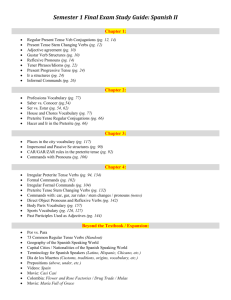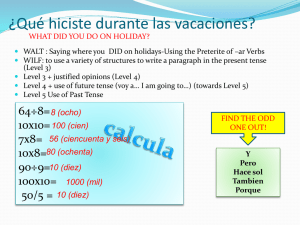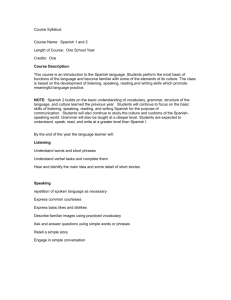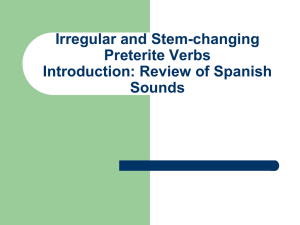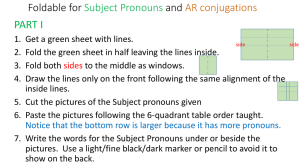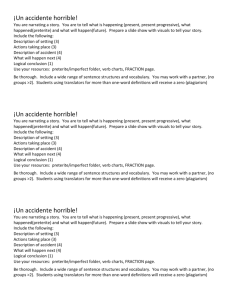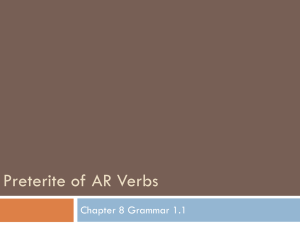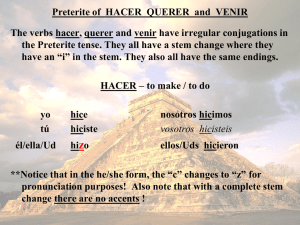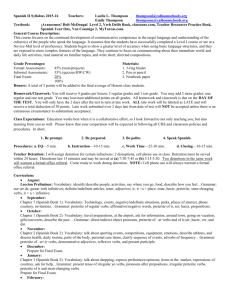Indirect Objects and Indirect Object Pronouns
advertisement
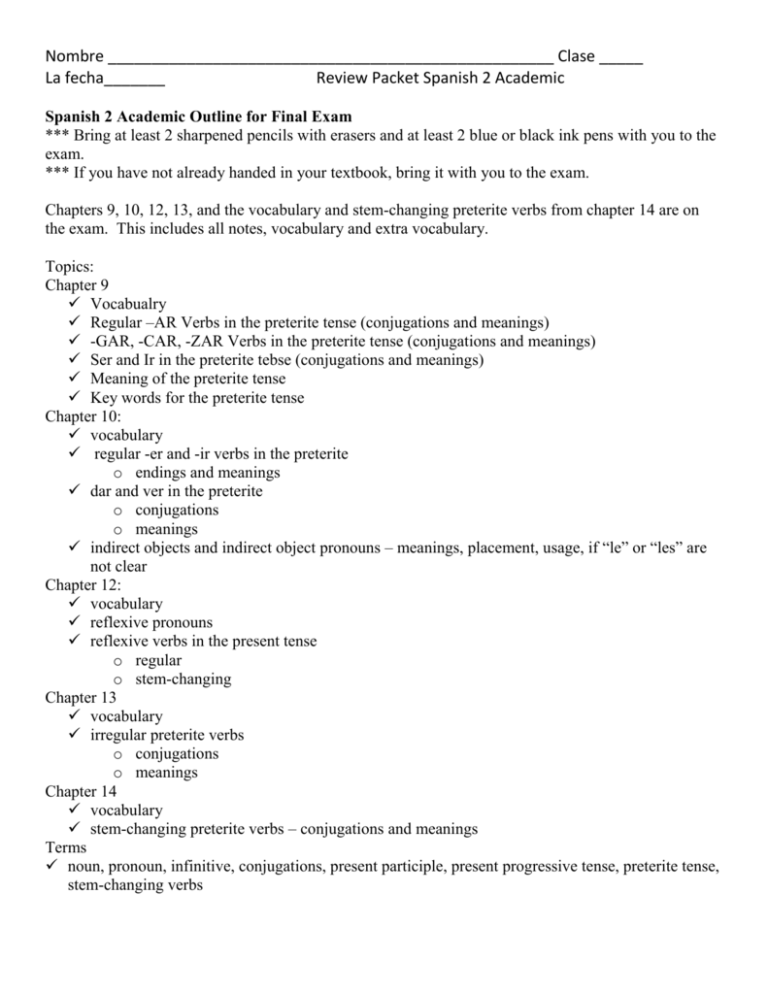
Nombre ___________________________________________________ Clase _____ La fecha_______ Review Packet Spanish 2 Academic Spanish 2 Academic Outline for Final Exam *** Bring at least 2 sharpened pencils with erasers and at least 2 blue or black ink pens with you to the exam. *** If you have not already handed in your textbook, bring it with you to the exam. Chapters 9, 10, 12, 13, and the vocabulary and stem-changing preterite verbs from chapter 14 are on the exam. This includes all notes, vocabulary and extra vocabulary. Topics: Chapter 9 Vocabualry Regular –AR Verbs in the preterite tense (conjugations and meanings) -GAR, -CAR, -ZAR Verbs in the preterite tense (conjugations and meanings) Ser and Ir in the preterite tebse (conjugations and meanings) Meaning of the preterite tense Key words for the preterite tense Chapter 10: vocabulary regular -er and -ir verbs in the preterite o endings and meanings dar and ver in the preterite o conjugations o meanings indirect objects and indirect object pronouns – meanings, placement, usage, if “le” or “les” are not clear Chapter 12: vocabulary reflexive pronouns reflexive verbs in the present tense o regular o stem-changing Chapter 13 vocabulary irregular preterite verbs o conjugations o meanings Chapter 14 vocabulary stem-changing preterite verbs – conjugations and meanings Terms noun, pronoun, infinitive, conjugations, present participle, present progressive tense, preterite tense, stem-changing verbs Chapters 9 and 10: Part 1: See vocabulary lists Part 2: Preterite Tense 1. What is the preterite tense? 2. What are key words that tell the speaker/ reader/listener that the sentence is in the preterit? Conjugate the following verbs in the PRETERIT. HABLAR CORRER Yo tú él, ella, Ud. nosotros ellos, ellas, Uds. Give the following conjugations in the yo form of the verb. 1. Jugar __________________________ 2. Comenzar _______________________ 3. Marcar__________________________ Give the following conjugations in the él form of the verb. 4. Empezar ________________________ 5. Pagar ___________________________ ESCRIBIR Conjugate and give meanings of ser and ir (preterite) Ser = Ir = Yo tú él, ella, Ud. nosotros ellos, ellas, Uds. Conjugate dar and ver in the preterit. DAR VER Yo tú él, ella, Ud. nosotros ellos, ellas, Uds. Part 3: Direct Objects and Direct Object Pronouns: 1. What is a direct object? 2. What is a direct object pronoun? What questions do they answer? 3. What are the direct object pronouns in Spanish? 4. Where can direct object pronouns be placed in Spanish? 5. Write an example from your notes of a sentence with the direct object in it and then the same sentence that uses the direct object pronoun. Part 4: Indirect Objects and Indirect Object Pronouns: 1. What is an indirect object? 2. What is an indirect object pronoun? What question does it answer? 3. What are the indirect object pronouns in Spanish? 4. Where can indirect object pronouns be placed in Spanish? 5. What do you do if “le” or “les” is not clear? Provide an example. 6. Write an example from your notes of a sentence with the direct object in it and then the same sentence that uses the direct object pronoun. Chapter 12: Part 1: See vocabulary List Par 2: Reflexive Verbs: See handouts, study guides question worksheet, links on my webpage of the school website. Chapter 13: Part 1: Vocabulary list Part 2: Irregular Preterite: See 3 handouts of the “I”stem, “u” stem, “J” stem, and “uv” verbs Answer the following questions below in complete Spanish sentences: 1. 2. 3. 4. 5. 6. 7. 8. 9. ¿Pusiste tus libros en tu mochila esta (this) mañana? ¿Pudiste comprender la tarea para la clase de español? ¿Freíste papas para la cena anoche? Anduviste por el parque la semana? ¿Estuviste en clase ayer? ¿Quisiste limpiar (to clean) tu cuarto? ¿Hiciste tu maleta anoche para ir de vacaciones? ¿Viniste a la escuela ayer? ¿Qué pediste de tus padres para tus cumpleaños? 1. 2. 3. 4. 5. 6. 7. 8. 9. Chapter 13: Part 1: Vocabulary list Part 2: Stem-changing preterit verbs – see chart created as study guide for chapter 14.
